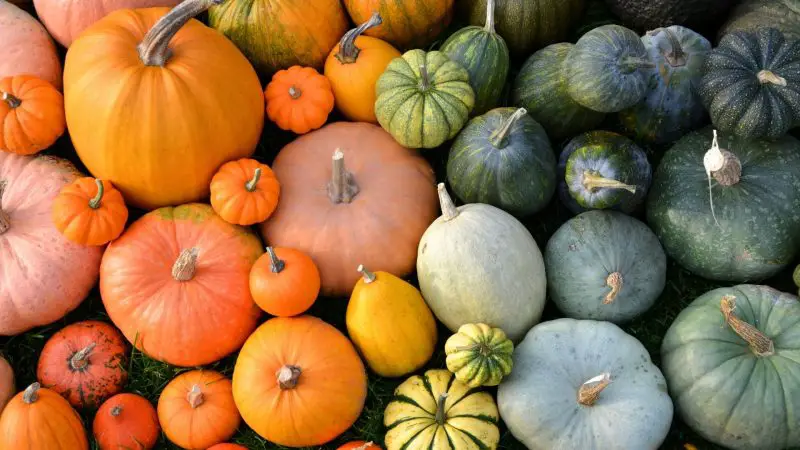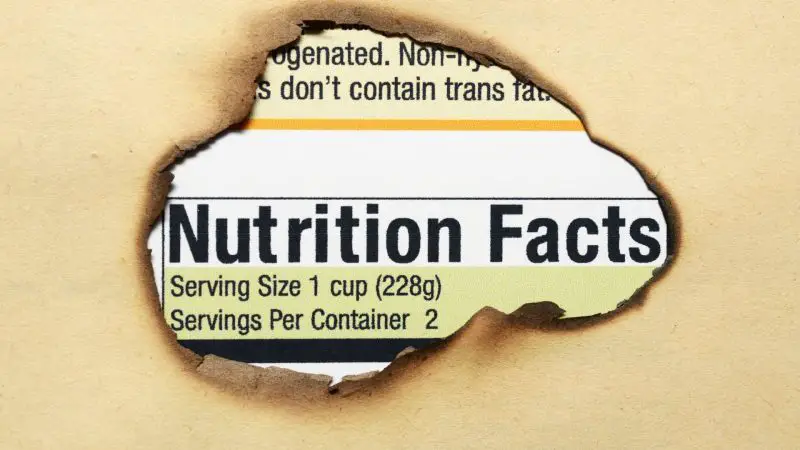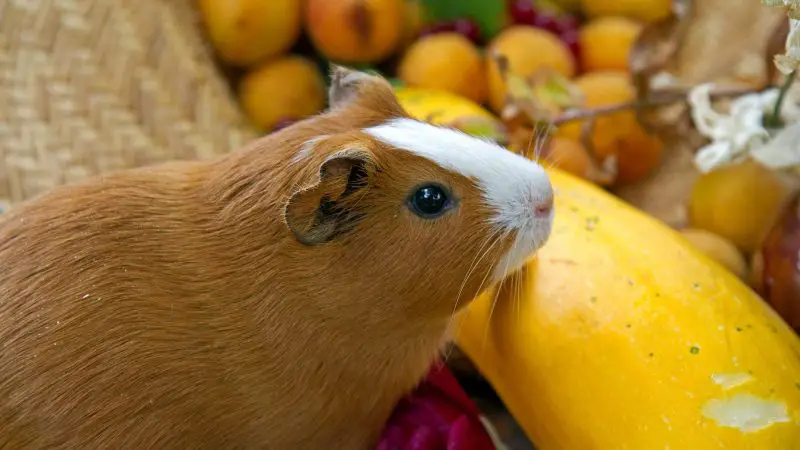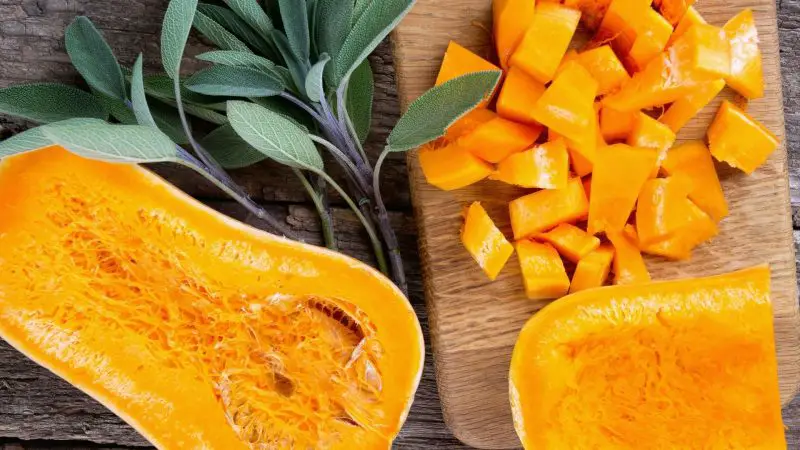Squash is an incredibly versatile vegetable that can be used for many meals. This vegetable has many different varieties, such as zucchini, rounded, crookneck, scallop, cousa, tatume, tromboncino, acorn, buttercup, butternut, delicata, dumpling, pumpkin, and this is already a lot!
You probably think your guinea pig can eat squash because guinea pigs are vegetarians, right? Well, let’s find out below.
Can guinea pigs eat squash? Guinea pigs can eat every type of squash, such as summer squash, including pattypan and zucchini; winter squash, including pumpkin and the butternut. They have nutrients that are essential to guinea pigs. However, the squash should only be served twice a week, in moderation and with proper preparation.
In the following sections, we will discuss how good this veggie is for our adorable cavies. We will present the nutrients present in this squash, all the benefits, possible risks, and also, you will find out some interesting facts about squash.
Table of Content
Is a Squash Good for Guinea Pigs? | Health Benefits

All types of squash are good for guinea pigs. These squashes contain vitamins and other nutrients that help prevent diseases and improve overall immunity. Here are some of its health benefits:
Prevention From Scurvy
Vitamin C in squash will help fight off any scurvy risk. This fatal disease occurs when the guinea pig doesn’t get enough vitamin C.
Guinea pigs can only get this through food or supplements, and they can’t create it naturally. Scurvy manifests itself with a rough coat, fatigue, loss of appetite, bleedings, strange discharges, diarrhea.
Healthy Blood
The vitamin K, iron, and copper in the squash will ensure that the blood is healthy, the immunity will be kept in good shape, and there will be less risk of anemia.
Weight Management
Squash is a low-fat food. This is ideal for guinea pigs to prevent them from becoming overweight.
Antioxidants
This vegetable is rich in antioxidants. It contains vitamin A and manganese, which are necessary for your pet’s internal and exterior health, boosts immunity, and lower the risk of most ailments.
Nutrition Facts of Squash

As an example, we will present the nutrients in winter squash, butternut. For 100 g (3 oz):
- Low in calories – 45 calories. The squash isn’t that caloric, which is good. It means your guinea pig will maintain a healthy weight.
- High in carbs and moderate in protein. The squash is very rich in carbs, 11.7 g, and it has a bit of protein too, 1 g. Additionally, carbs can usually increase weight, but since you will feed squash to the guinea pig moderately, it isn’t a problem.
- Sugar – 2.2 g. This amount of sugar could be a bit too much for the guinea pigs, especially since this is a veggie.
- Low in fat – 0.1g. Squash isn’t a fattening type of food, as it has low amounts of fat.
- Vitamin A – 213%. This vitamin is a strong antioxidant that keeps the health of the skin, heart, kidneys, vision, lungs and boosts immunity.
- Vitamin C – 35%. Guinea pigs need lots of this vitamin to survive and to be healthy. Without it, they can get a dangerous disease called scurvy.
- Vitamin E – 7%. This vitamin improves the quality of the skin, prevents some cancers, improves eyesight, boosts immunity, and prevents inflammation.
- Thiamin – 7%. Thiamin is the B1 vitamin. This vitamin creates a better electrolyte flow to all muscles and nerves.
- Riboflavin – 1%. It is also known as vitamin B2. This vitamin converts foods into energy, making a better oxygen flow through the body.
- Niacin – 6%. Niacin is a B3 vitamin, and it can lower cholesterol, prevent heart diseases and diabetes. It also improves skin elasticity.
- Vitamin B6 – 8%. The B6 vitamin reduces stress and helps with better sleep. Also, it increases serotonin production (happiness hormone)
- Calcium – 48 mg. There is a lot of calcium in the squash! This is not very good for the guinea pigs because this mineral damages their urinary tract. It forms strong bones, but it shouldn’t be consumed in excess by grown guinea pigs.
- Iron – 4%. It is a vital mineral for the organism. This can be found in the red blood cells, and its role is to give energy, remove fatigue, and prevent anemia.
- Magnesium – 8%. Magnesium prevents diabetes and heart problems, and it makes bones stronger.
- Potassium – 10%. Potassium lowers high blood pressure and prevents kidney stone formation.
- Manganese – 10%. Manganese is another antioxidant in squash. It reduces the risk of most diseases caused by damage of free radicals. Also, it can reduce inflammation, regulate blood sugar, and boost immunity.
Feeding Squash to Guinea Pigs | Possible Risks

Here are the risks to consider when you feed guinea pigs with squash:
Urinary Problems
The calcium in the squash will severely damage the urinary tract in the guinea pigs. When they are young, they can ingest moderate amounts of calcium for strong bones.
But, when the guinea pigs grow up, they shouldn’t eat foods with lots of calcium. If they do, the calcium piles up in their urinary tract, and it can form kidney/bladder stones or even cause infections, blood in urine, and painful urinating.
Digestion Problems
Squash also has sugar. For a veggie, this amount is moderate, but still, this amount is not so good for the guinea pigs. They need small amounts of sugar. Otherwise, there is a risk of painful digestion, diarrhea, cramps, and gasses with higher amounts.
Serving Size and Frequency of Squash for Guinea Pigs

As for the serving of a squash:
Step 1: Start by washing off the vegetable to remove any bacteria or harmful chemicals that could be present.
Step 2: You can cut it into little cubes offering the meaty part.
Step 3: One cup or a handful is enough.
Squash can be given to them 2 to 3 times a week.
Are Squash Skin, Seeds, and Stem Edible for Guinea Pigs?
Some types of squash seeds and stems should be removed since they might choke your pet. Also, you can leave the squash skin, depending on your pet’s preference. However, there are types of squash with thick skin that are not edible for the guinea pigs.
Quick Facts on Squash
- The summer squash can be pattypan or zucchini. It has thick skin and can be eaten whole (seeds and skin).
- Winter squash is, for example, the pumpkin and the butternut; they have thicker skin that is not edible, the flesh is rougher, and seeds should be removed before consumption.
- Squash is related to melons and watermelons.
- The winter squashes have a long shelf-life; they can last even months in a dark and cool place.
- Winter squashes are called like that because they are stored well during the cold winter months! In fact, they are harvested in the fall, not winter.
- The spaghetti squash has nothing to do with the pasta spaghetti! It is called that way because when it is cooked, the flesh separates and makes shapes like noodles.
- The evidence of squash cultivation dates back to 8000 BC in Peru, Central Mexico, and USA territory.
- The word ‘squash’ comes from the Native American word ‘askutasquash’, meaning ‘eaten raw and uncooked’.
- Squashes are also used for making candles in Latin America.
Here are more information and facts about different types of squash:
We have also made a full list of foods that guinea pigs can and can’t eat (150+ Types of Foods). Be sure to also check our recommended products page for everything you will ever need to assure a happy life for your guinea pigs. Hope this information was helpful and you have found the answer you were looking for.
Related: Can Guinea Pigs Eat Yellow Squash? (Benefits, Risks, Serving Size & More)
